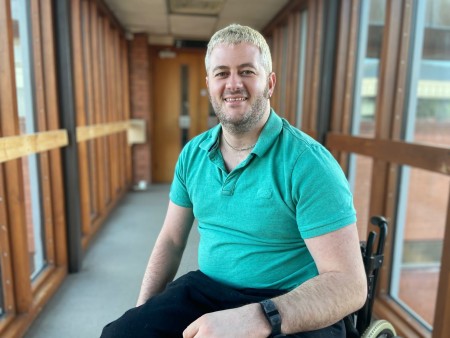Publish date: 3 December 2021
This Disability History Month, Paul Belk, our enable staff network chair talks about his disability, how it affects him and support available at work.

When Paul took a break after the first year of a music degree at Newcastle University in 2005 to go backpacking in Asia, he was a fit, athletic 20-year-old.
His ambition was to be a drummer and he played in a number of bands in his hometown of South Shields in Tyneside. However, within weeks of arriving in Thailand, Paul was in hospital in a coma with a prognosis of a 2% chance of living.
It transpired that his drink had been spiked in a bar and, after slipping into unconsciousness, his brain had been starved of oxygen.
After three months Paul came out of the coma and returned home to the UK, but while his cognitive functions were intact, he needed to use a wheelchair and moved into Chase Park rehabilitation centre in Gateshead initially to recover.
More than fifteen years after he was hospitalised, Paul works in payroll, lives independently with his wife in South Shields and is enjoying getting back into music in particular playing the drums which he couldn’t do initially after the accident.
“I joined the trust doing a modern apprenticeship in business administration and I’m a clerical officer in payroll based at Cobalt. I have also recently completed an NVQ Level 3 in business admin to assist with potential job opportunities in the future.
My disability heavily affects me every day, from getting up to going to bed on the night. I have had to adapt my entire life to help adjust to being a wheelchair user and having cognitive impairments too.
I have to do stretches twice daily to help keep my limbs supple and functioning, I also see a physiotherapist twice a week to help with this too.
The trust has helped me by adapting my workstation and making it accessible and tailoring training to allow me extra time to learn new skills/tasks that I need for my job due to the underlying effects of my brain injury that some still affect me, even 16 years on.
When I struggle with my thoughts, my wife Rachel helps me rationalise things which I find a massive help. This is also a side-effect of my acquired brain injury that still has an impact today.
It literally changed my life, both physically and mentally. This has helped me appreciate the difference between the able-bodied world and the disabled world; ‘two worlds’ as I see them now and also helped me adapt in some instances.
There are many things I wouldn’t have considered before that can make a huge difference to a disabled persons life. These include things to promote people’s independence like making toilets/offices accessible to wheelchairs and being able to attend social events like music festivals and gigs. I now have to do these with someone accompanying me which I find a frustrating but is worth it as it allows me to see live music, which is something I am passionate about.
I did some work in this area when helping to design a fully inclusive music festival called ‘Chase Park Festival’ and it’s one of my proudest moments. We had wheelchair tracking around the grass so that wheelchairs and prams had better access to the stages and we also had sign language interpreters to make it more enjoyable.
Now I try to help the disabled community through my work with our Enable Staff Network and the other staff network groups’ chairs.
I’m passionate about promoting a more inclusive, more accessible world which I know through lived experience will tremendously help a disabled person like myself improve their quality of life.
I am also very aware that there are many more types of disabilities, some of which can be very hard/difficult to see, which must add extra frustration to their lives and make it harder to live with their disabilities too. These include diabetes, chronic pain or fatigue, respiratory conditions and incontinence, as well as learning difficulties, mental health conditions and sensory impairment.
One day I would like to become an access officer as I feel I would have some valuable contributions, to improve disabled people’s lives in terms of access from a wheelchair users’ perspective.
These are some of the reasons why it’s important to support Disability History Month to try to improve everyone’s understanding of disabilities as some of the problem can come from people not knowing/ignorance. As I have said, this was me before I had my accident!”
So if you get the chance use Disability History Month to find out more about hidden disabilities, the theme for 2021, by visiting our libraries, taking part in events and training.
